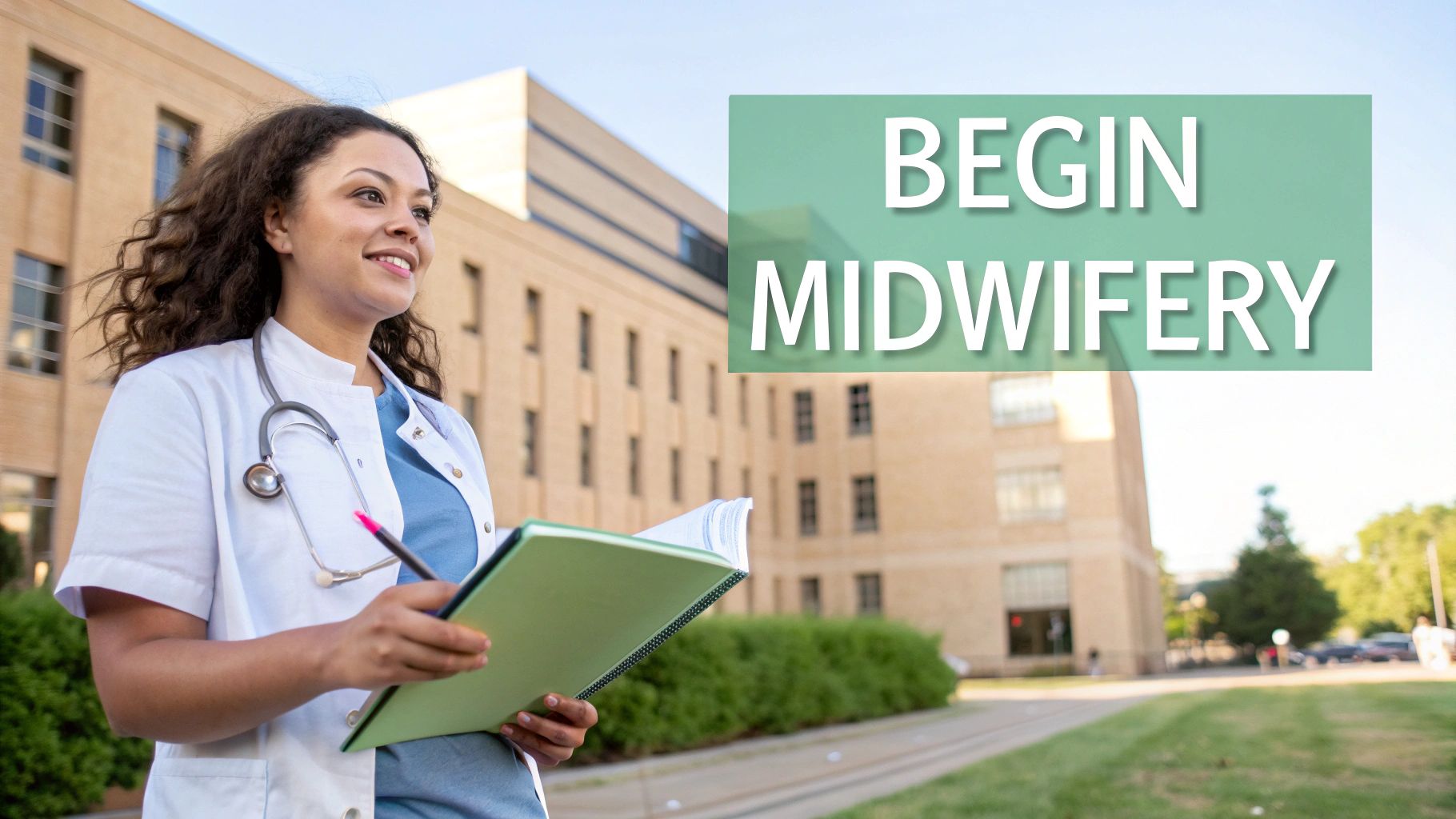
Ever wondered if being a midwife is more than just one single job role? The answer is a resounding yes! A career in midwifery is a rich and varied path, offering a surprising number of specialisms that could be the perfect fit for your skills and passions. If you're considering a midwifery course, understanding these different roles is your first step to picturing your future.
Thinking about becoming a midwife is a calling—a desire to be at the very heart of family and community healthcare. This guide will walk you through the different types of midwives you could become in the UK, what makes each role unique, and how you can start your journey, even without the traditional A-Levels.
What Kinds of Midwifery Roles Exist in the UK?
Once you qualify with a midwifery degree, you're not funnelled into a one-size-fits-all job. Instead, a world of diverse and fulfilling career paths opens up, each with its own focus and pace. Figuring out which of these roles speaks to you is a key part of envisioning where your passion for midwifery could take you.
Many midwives move between different settings throughout their careers, building a rich tapestry of experience. From the high-energy buzz of a hospital to the intimate, ongoing care within a community, there’s a role to match every personality and calling.

Hospital and Community Midwives: The Core Roles
The two most common routes for newly qualified midwives are into hospitals and the community. They offer vastly different day-to-day experiences and are a great place to build your foundational skills.
-
Hospital Midwife: Do you thrive in a fast-paced, team-based environment? Working in a hospital puts you right at the centre of the action. You might be on a bustling labour ward, a postnatal unit supporting new parents, or in a calm midwife-led birth centre. This role is perfect if you have a love for the dynamic, clinical side of birth.
-
Community Midwife: This role is all about building relationships and providing continuity of care. You'll get to know families over many months, supporting them from their first antenatal appointment through to postnatal visits in their own homes. If you value autonomy and providing holistic, personalised support in a local setting, community midwifery could be your ideal fit.
A crucial part of community midwifery is empowering families in their own environment. You see first-hand the joys and challenges they face, allowing for truly person-centred care that builds trust and confidence throughout the entire pregnancy journey.
Specialist and Independent Midwives: Advanced Pathways
Once you've got some experience under your belt, you can branch out into highly specialised or even entrepreneurial roles. These paths require deep expertise and a real passion for a particular area of care.
-
Specialist Midwife: Are you passionate about a specific area of health? Specialist midwives focus on particular needs, such as perinatal mental health, diabetes in pregnancy, bereavement support, or public health. They often become the go-to experts in their field, leading services and providing advanced care for those with more complex situations.
-
Independent Midwife: If you have an entrepreneurial spirit, you might choose to work outside the NHS by setting up your own practice. This path offers the ultimate autonomy, allowing you to provide one-to-one care that’s entirely shaped by your own philosophy. It demands strong business skills alongside your clinical expertise.
Exploring these pathways just goes to show how varied and exciting a career in midwifery can be. The very first step towards any of these roles is getting that place at university, and a flexible midwifery course preparation programme can be the key to helping you get there.
Your Journey into Midwifery Starts Here
The need for skilled midwives across the UK is as strong as ever. The healthcare landscape truly depends on a steady stream of new professionals to support growing families. The latest data from the Nursing and Midwifery Council shows that by March 2025, the total number of registered midwives hit 46,606. That’s a 5.6% increase in just one year, which really highlights how vital this role is. You can discover more about the midwifery workforce on Mentor Merlin.
The Path to Becoming a Midwife
Your journey from that initial spark of interest to becoming a fully qualified midwife follows a few key stages. It’s a structured process that transforms your passion into a real career through a blend of classroom theory and practical, hands-on work in clinical settings. Each phase builds on the last, making sure you’re completely ready for the responsibilities that come with being a midwife.
Ultimately, finishing a midwifery degree isn't just about getting a certificate. You're preparing to make a genuine, lasting impact on the lives of families every single day.
Getting Your Foot in the Door: University Entry Requirements
Securing a place on a university midwifery degree is competitive, there’s no doubt about it. But with the right preparation, it's absolutely within your reach. Universities aren't just looking for top grades; they want to see candidates who have a genuine passion for the profession and a real understanding of what it entails. Let’s break down exactly what you’ll need to put together a strong application.
Before you even think about applying, it's worth getting your head around the basics of understanding high school graduation requirements, as these form the bedrock of any university application.
Your Academic and Personal Toolkit
While every university has its own specific criteria, there are a few common requirements you'll find pretty much everywhere.
-
GCSEs: You’ll generally need at least five GCSEs at grade 4 (C) or above. Critically, these must include English, Maths, and a Science subject. Think of these as the non-negotiable foundation of your application.
-
Level 3 Qualifications: On top of your GCSEs, you'll need A-Levels or an equivalent Level 3 qualification. Biology is a popular A-Level choice, but other sciences and social sciences are also highly valued. An Access to HE Diploma is another brilliant, widely accepted route.
-
Work Experience: This is where you can really shine. Getting some relevant experience under your belt is crucial. Volunteering at a maternity unit, a children's centre, or even with a local breastfeeding support group shows you're committed and gives you invaluable real-world insight to talk about in your application and interview.
Beyond the grades, universities want to see the person behind the paper. They’re looking for the core qualities of a midwife—compassion, brilliant communication skills, and resilience. Your personal statement is the perfect place to let these attributes come to life. For a deeper dive, check out our guide on what you need to become a midwife in the UK.
A strong application tells a story. It weaves together your academic achievements with personal experiences to show that you don't just understand the values of midwifery—you're ready for the demands of the profession.

Finally, a couple of procedural but essential steps. You'll need to complete a Disclosure and Barring Service (DBS) check and an occupational health screening. These are just standard procedures to ensure you're fit for clinical practice and a safe professional to have around patients and their families.
A Flexible Pathway to Your Midwifery Degree
So, what happens if you have the passion and the drive to become a midwife, but don't have the specific A-Levels universities are asking for? For many people, especially adult learners, this can feel like a huge roadblock. But there’s a well-respected and proven route designed exactly for people in your position: the Access to Higher Education Diploma.
This qualification is your key to unlocking that university place. It’s a Level 3 diploma, which is equivalent to A-Levels, and it’s widely recognised by UK universities as the right entry ticket for degrees like midwifery. The whole course is built to give you the specific academic knowledge and UCAS points needed to put together a strong application, focusing on subjects that are directly relevant to your future career.
Study That Fits Your Life with Stonebridge
For anyone juggling work, family, or other commitments, trying to fit into a traditional college timetable is often just not possible. This is where a fully online preparatory programme for your midwifery course can make all the difference. Imagine being able to study from home, moving at your own pace, and at times that genuinely work for you.
Stonebridge Associated Colleges offers the Access to Higher Education Diploma (Midwifery) through a unique subscription model that gives you incredible freedom and takes away financial pressure.
Here’s why this modern approach works so well for aspiring midwives like you:
-
No Long-Term Debt: Forget signing up for a large, long-term credit agreement. You just pay a simple, manageable monthly fee.
-
Total Flexibility: You have the freedom to pause your studies if life gets in the way or cancel your subscription at any time without any penalties.
-
Study at Your Pace: You can progress through the modules as quickly or as slowly as you need to. You’re not tied to a fixed academic year, which means you can tailor your learning journey to fit you perfectly.
This model has been designed with the realities of adult life in mind. It ensures that money worries or unexpected life events don’t have to derail your dream of becoming a midwife. By offering a route that is supportive, flexible, and affordable, it makes a career in midwifery more accessible than ever, no matter what your background or previous education looks like.
Navigating the Realities of Midwifery Training
Embarking on a midwifery course is an incredible journey, but it’s one you need to walk into with your eyes wide open. The training is intense. It demands more than just late-night study sessions; it requires real emotional resilience and a solid life plan to see you through to the end.

Let’s be honest about the two biggest hurdles: time and money. With around 50% of your course spent in unpaid clinical placements, holding down a part-time job becomes almost impossible. This financial squeeze is a massive factor for many students.
In fact, recent reports paint a stark picture: approximately 75% of midwifery students in England graduate with debts of over £40,000. The constant juggling act of study, placements, and trying to earn a living contributes to around 15% of students dropping out. It's a tough reality to face, and you can read the full report on midwifery workforce sustainability for more detail.
Building Resilience and Finding Support
Beyond the practicalities, the role itself will test your emotional strength. You might witness the purest joy of a new life and the deepest sorrow of loss, sometimes all in the same shift. That’s why developing emotional resilience isn’t just a buzzword; it’s a core part of becoming a midwife.
Building a strong support network isn't just a nice idea—it's absolutely vital. Make sure you connect with:
-
Your fellow students: They’re in the trenches with you and will understand the highs and lows like no one else.
-
University tutors and placement mentors: These are your go-to people for academic guidance and professional advice.
-
Friends and family: They’re your cheerleaders, offering a listening ear and a much-needed dose of normality.
Getting a taste of the real world before you even apply can also make a huge difference. Our guide on how to get midwifery work experience is packed with tips to help you prepare.
Thriving during your midwifery training means being proactive about your wellbeing. Acknowledge the pressures, build your support system early, and never hesitate to ask for help when you need it. This foundation will serve you well throughout your entire career.
This honest look at the challenges isn't meant to put you off. Quite the opposite. It’s about giving you the awareness and tools to navigate the tough times, so you can flourish both personally and professionally on your path to becoming a registered midwife.
Common Questions About Midwifery Courses
Deciding to become a midwife is a massive step, and it’s completely natural to have a whole host of questions swirling around. Getting clear, straightforward answers is the best way to feel confident about planning your future.
So, let's dive into some of the most common queries from people just like you, thinking about starting this amazing journey.
How Long Does a Midwifery Course Take?
For most people starting from scratch, a standard undergraduate midwifery degree in the UK is a three-year, full-time course. This timeline is carefully designed to give you the perfect blend of theory and practice, splitting your time roughly 50/50 between university-based learning and hands-on clinical placements.
If you’re already a qualified and registered adult nurse, there’s often a faster route. You can take a shortened 'conversion' course, which typically gets you qualified in about 18 months.
Is a Midwifery Course Hard to Get Into?
To be frank, yes. Entry onto midwifery degree programmes is known for being very competitive. Universities get a huge number of applications every year for a pretty limited number of places, so you really need to stand out.
Successful applicants don’t just have strong academic grades in the right subjects. They also, crucially, have some kind of work or volunteer experience that shows a genuine, heartfelt commitment to the profession.
Can I Study a Midwifery Course Entirely Online?
No, it’s not possible to complete a full midwifery degree entirely online. A huge part of the qualification is the thousands of hours of hands-on clinical practice you need in real-world healthcare settings. That’s something you simply can't replicate through a screen!
However, what you can do is get yourself university-ready online. Preparatory courses, like an Access to HE Diploma (Midwifery), are often designed to be completed 100% online. This gives you the qualifications you need for university entry with the flexibility to fit it around your life.
What Are the Career Options After Qualifying?
Once you’ve qualified and registered with the Nursing and Midwifery Council (NMC), a whole world of career paths opens up. Many newly qualified midwives start their careers in NHS hospitals, as it's a brilliant way to build a solid foundation of experience.
But that's just the beginning. Later on, you could choose to specialise in areas like community midwifery, neonatal care, or public health. Other routes might take you into management, research, education, or even setting up your own independent practice.
Ready to take the first step towards your midwifery career, even without the traditional entry requirements? The Access to HE Diploma (Midwifery) at Stonebridge Associated Colleges is your flexible, online pathway to university. With our subscription model, you can study at your own pace, fit learning around your life, and achieve your dream on your own terms. Enrol today and start your journey with Stonebridge Associated Colleges.




